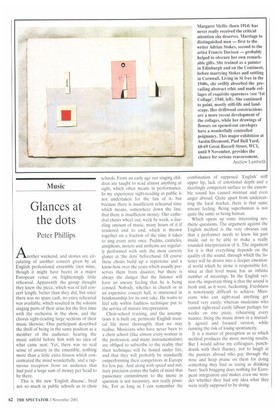Glances at the dots
Peter Phillips
Another weekend, and stories are circulating of another concert given by an English professional ensemble (not mine, though it might have been) in a major European venue on frighteningly little rehearsal. Apparently the group thought they knew the piece, which was of full concert length, better than they did, but since there was no spare cash, no extra rehearsal was available, which resulted in the soloists singing parts of their arias for the first time with the orchestra in the show, and the chorus sight-reading large sections of their music likewise. One participant described the thrill of being in the same position as a member of the audience: hearing the music unfold before him with no idea of what came next. Yet, there was no real sense of anxiety in the ensemble, nothing more than a little extra frisson which concentrated the mind wonderfully, and a rapturous reception from an audience that had paid a large sum of money per head to be there.
This is the new 'English disease', bred not so much in public schools as in choir schools. From an early age our singing children are taught to read almost anything at sight, which often means in performance. In my experience sight-reading in public is not undertaken for the fun of it, but because there is insufficient rehearsal time which means, somewhere down the line, that there is insufficient money. Our cathedral choirs wheel out, week by week, a dazzling amount of music, many hours of it if rendered end to end, which is thrown together on a fraction of the time it takes to sing every note once. Psalms, canticles, antiphons, motets and anthems are regularly performed with only the most cursory glance at 'the dots' beforehand. Of course these choirs build up a repertoire and a know-how over the years which usually preserves them from disaster, but there is always the danger that the listener will have an uneasy feeling that he is being conned. Nobody. whether in church or in an expensive concert hall, is interested in brinkmanship for its own sake. He wants to feel safe within faultless technique put to the service of mature interpretation.
Choir-school training, and the assumptions it is built on, permeate English musical life more thoroughly than we may realise. Musicians who have never been to a choir school (like almost every woman in the profession, and many instrumentalists) are obliged to subscribe to the reality that their technique will be honed under fire, and that they will probably be standardly outperforming their competitors in Europe for less pay. And along with speed and military precision comes the habit of mind that passionate commitment to the music in question is not necessary, nor really possible. For as long as I can remember the
combination of supposed 'English' stiff upper lip, lack of emotional depth and a dazzlingly competent surface to the ensemble sound has caused mistrust and even anger abroad. Quite apart from undercutting the local market, there is that same uneasy feeling. Being superhuman is not quite the same as being human.
Which opens up some interesting aesthetic questions. The argument against the English method is the very obvious one that a performer needs to know his part inside out to be able to make a really rounded interpretation of it. The argument for it is that everything depends on the quality of the sound, through which the listener will be drawn into a deeper emotional world which he alone is responsible for, since at that level music has an infinite number of meanings. In the English version the important thing is that the sound is fresh and, as it were, beckoning. Freshness is notoriously difficult to achieve. Musicians who can sight-read anything get bored very easily; whereas musicians who cannot sight-read easily labour perhaps for weeks on one piece, rehearsing every nuance, fixing the music down in a mutually agreed and focused version, while running the risk of losing spontaneity.
It is a matter of perception as to which method produces the more moving results. But I would advise my colleagues, punchdrunk with their fluency, not to laugh at the punters abroad who pay through the nose and heap praise on them for doing something they find as taxing as drinking beer. Such bragging does nothing for European integration and makes even me wonder whether they had any idea what they were really supposed to be doing.


















































































 Previous page
Previous page